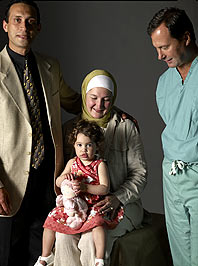
Patient: Osama Yakout, cabdriver
Doctor: Peter Schlegel, urologist, New York-Presbyterian Hospital, Weill Cornell
Patient’s wife: Paula Desrochers-Yakout
Osama: I had come from Egypt in 1992, and I was driving a yellow cab and taking classes at NYU. One day, I went to the imam and said, “I’m looking for a good wife.” He said, “Come back here at seven o’clock on Thursday.” I went, and he said, “See that woman sitting there?” I said, “My God! This is the woman I’ve been looking for my whole life!”
Paula: We’re Muslim; we don’t date. We knew after a week that we would marry.
Osama: For the whole week, I was stuck: If I tell her what’s going on with me medically, she may refuse me. But if I don’t tell her, she will find out someday. Finally I said, “I need to speak to you—it’s important.”
Schlegel: In 1999, Osama developed an aggressive testicular tumor. His treatment involved the removal of his testicle and a full dose of chemotherapy.

1. Conductor, 89, With Heart Problems, Too Old and Sick for Surgery2. Firefighter Separates Spine From Skull3. Taxi Driver Survives Testicular Cancer4. Baby With Severe Back and Rib Problems5. College Student Going Blind in Both Eyes6. Factory Worker Loses Hands7. Hockey-Mad 5-Year-Old Has Potentially Fatal Tumor8. Woman Carrying Triplets Has Torn Aorta9. Woman Needs Heart and Lung Transplant10. Hip-Replacement Complications May Cost a Woman Her Leg11. Four Siblings With Potentially Fatal Kidney Disease

Osama: The doctors told me the chemo would kill most of my sperm. The cancer was already eight or nine months old. They said, “If you start the treatment now, you have the chance to be cured.” Having a baby didn’t seem as important as having my life.
Schlegel: The chemotherapy destroyed all the sperm-producing cells in 95 percent of the remaining testicle.
Osama: I said to Paula, “I don’t need your answer now. Take your time.” She said, “I don’t need any time.”
Paula: I was 35 years old. I met my soul mate. And I wasn’t going to give him up for anything. I said, “God willing, children come into our lives in different ways.”
Schlegel: Before they came to see me, they’d seen at least one other doctor who didn’t think treatment was possible.
Paula: An IVF doctor told us we would never have children. I was disappointed and upset. Then I learned there was a doctor doing this highly specialized surgery.
Schlegel: I remember they were rather down. They came in with biopsy slides. There wasn’t much there. Our approach, which we pioneered, is to open the testicle and use an operating microscope to search through all areas to find the few sites making sperm. Biopsy success rates are 10 or 20 percent; we’ve brought that to 60 percent.
Osama: When he looked at the slides, he said, “I see sperm.” I said, “Doctor, please make sure.” He said, “I’m positive.” And I cried. We both cried.
Schlegel: Once we locate sperm in the testicle, we use micro-forceps to pluck out the good tubules, the vessels where sperm is made. Each one goes into supportive fluid, where it releases the sperm. A member of the IVF team is right there, and they look for the healthiest sperm. We like to have at least a thousand. Osama had tens of thousands.
Paula: Two hours after my husband went into surgery, Dr. Schlegel was walking down the hall, telling me that he got some good sperm. I said, “Thank God!”
Schlegel: The sperm we get is relatively weak; it will only survive a few days. Paula was in the midst of an IVF cycle that was timed to have her eggs retrieved the next day. Only two of her eggs had developed enough to be injected with sperm—normally we like to have ten or twelve. She had a 30 percent chance of getting pregnant.
Paula: We pray five times a day, but we did a lot of extra praying. Sarah was born at 9:37 P.M. on November 23; she just turned 18 months.
Osama: Every month on the 23rd, we celebrate her birthday. I call her Soso. She loves water, loves to read. She understands English and Arabic. She’s a happy kid.
Paula: Osama’s body has started to generate some sperm. Dr. Schlegel says we can try again. As we say in prayer, Hasbunallah wa ni’mal wakil (Allah is enough for us, and he is our best helper.) Next: Baby Born With Severe Back and Rib Problems